Ireland Resume Formats, Templates, and Writing Tips
Applying for a job in Ireland? This Ireland resume guide has some tips, FAQs, and templates to inspire you to write the perfect resume.
If you want to land a job in Ireland, you will need to write a great Ireland resume.
For your resume to be successful, it must have all the right personal details and professional qualifications.
To make sure your Ireland resume is ready for your job search, this article will discuss:
- Ireland resume formats
- Ireland resume requirements
- How to write an Ireland resume
- Ireland resume tips
- Ireland resume FAQs
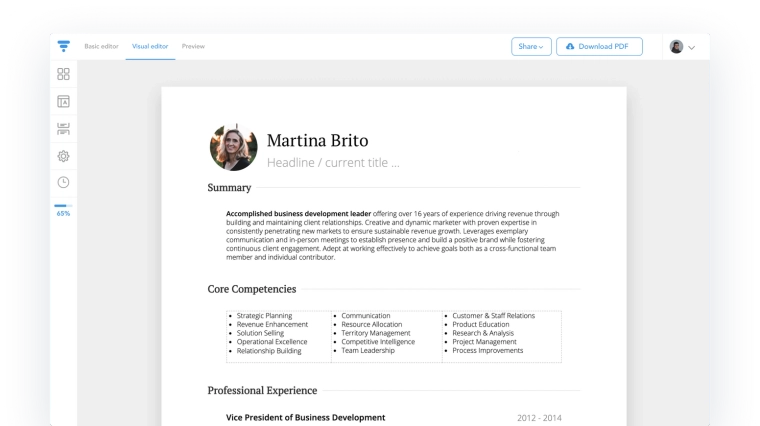
Ireland Resume Requirements
Before you start writing your Ireland resume, make sure you have all the right personal details ready. Different countries have different resume expectations, so it’s important to know what to include and what to leave out.
What to include in an Ireland resume
- Name
- Phone Number
- Email Address
- Address
What not to include in an Ireland resume
- Photo
- Date of Birth
- Marital Status
- Nationality
Ireland Resume FAQs
If you are writing a resume for the first time, you might have some questions. Here are some common Ireland resume questions, answered:
How long should an Ireland resume be?
Your Ireland resume should be one or two pages long.
If you are new to the workforce, or a mid-career professional, one page should be enough. With some careful editing, you should be able to condense all of your best skills and experiences to a single page. Hiring managers aren’t likely to turn to a second page, it’s important to learn how to condense your experience as much as possible.
If you have decades or experience, you may need a second page to contain all of your accomplishments. If you do write a two-page resume, however, make sure you can entirely fill both pages. A blank half-page at the end will look odd.
What is the best Ireland resume format?
The right resume format will depend on your skills and experience.
There are two common resume formats: the reverse-chronological resume format, and the skills-based resume format.
In a reverse-chronological format, your work experience is the focus of the resume. The Work Experience section is the longest section of the resume, with past positions listed in reverse-chronological order, beginning with your most recent role and working backwards. Other sections, like the Skills and Education sections, will be shorter. This is the most common resume format, and the one most job-seekers should use.
In a skills-based format, the Skills section is the most important part of the resume. It will take up the most space and have the most detail. The Work Experience section will be shorter, with less detail for each past position, and past roles may be sorted either reverse-chronologically or by relevance. This format is less common, and should only be used if your work history is less impressive than your skill set.
The best resume format for you will depend on you, your career, and your career goals.
If you have had a typical career, with past roles showing clear progression in your industry, the reverse-chronological resume format is the best choice for your Ireland resume. This format shows a clear timeline of your career, so employers can see exactly what your experience is and where you are coming from. You can highlight your achievements in each role and demonstrate what makes you a great employee.
If you have had a less traditional career, with a job timeline that is more difficult to explain, you may want to consider a skills-based resume. For example, if your work history includes career changes, job-hopping, or long absences, you may want to draw attention to your skill set instead of your past roles. If this is the case, a robust skills section with accomplishments and examples can help showcase your abilities and distract from any red flags in your work history.
What is the best Ireland resume font?
For an Ireland resume, it is best to stick to a plain, readable font. Simple fonts like Open Sans, PT Serif, and Assistant all look great in a resume.
Some job-seekers will use one font for headings and another font for body text, so there is more difference between the two. This can be a great way of making sure headings are easy to identify in your resume. If you do this, however, make sure you pick two fonts that work well together. Otherwise, one font is enough.
What is the best Ireland resume filetype?
It is always best to submit your resume as a PDF.
A Word document is acceptable, but a PDF is more reliable. Word documents can have different formatting when viewed with a different word processor or operating system. If you want to make sure your resume looks the same on your computer and the hiring manager’s computer, it is best to submit it as a PDF.
Some job-seekers worry that applicant tracking systems will find it easier to read Word documents than PDF documents. This used to be true, but resume-parsing technology is the best it has ever been. As long as your PDF is well-organized, the applicant tracking system will be able to read it just as well as a Word document.
Is it “CV” or “resume” in Ireland?
In Ireland, it is more common to say “CV” than “resume”. However, CV refers to what North Americans would call a resume, rather than the longer academic CV. The two terms are used interchangeably in Ireland.
What is the best Ireland resume template?
The best resume template will depend on your industry and the job you are applying to.
If you work in an old-fashioned industry, like finance or law, you will likely want to use a more traditional resume template. Traditional resumes have one column, plenty of white space, and no colours. VisulCV’s ATS template, for example, is a great choice for traditional industries.
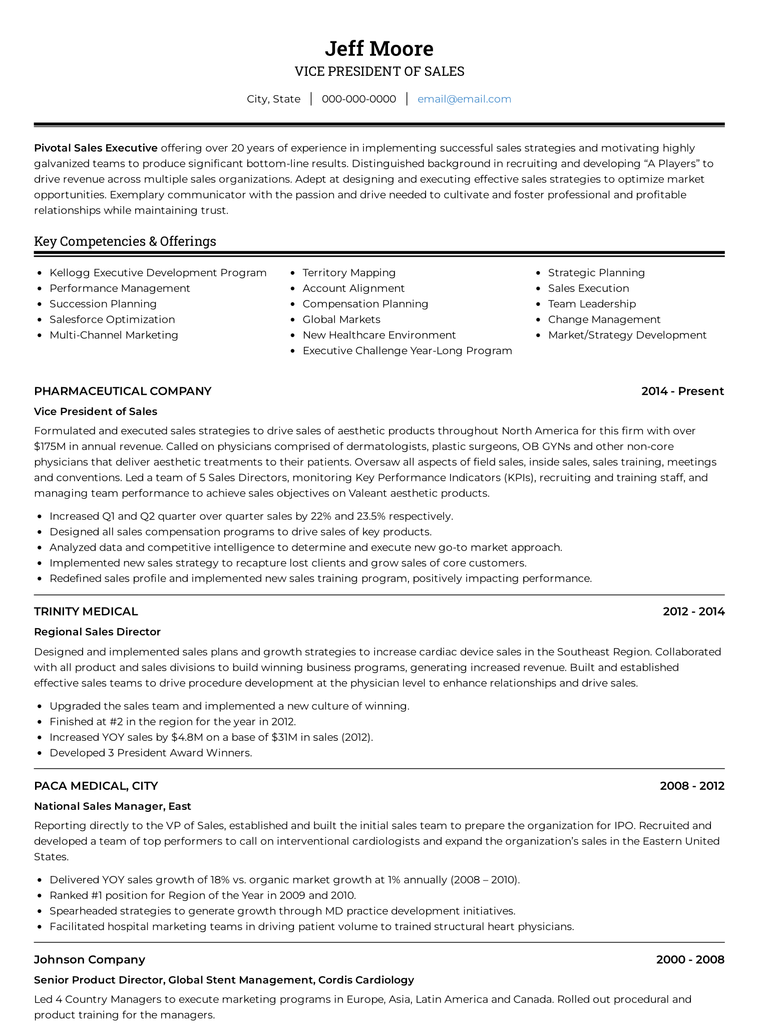
If you are in a more modern field, like social media marketing or graphic design, a more stylish resume template might work for you. Modern resume templates might have multiple columns, a splash of colour, or even a header image. VisualCV’s Rainier template, for example, is eye-catching and colourful, while maintaining a professionalism that is sure to impress hiring managers.
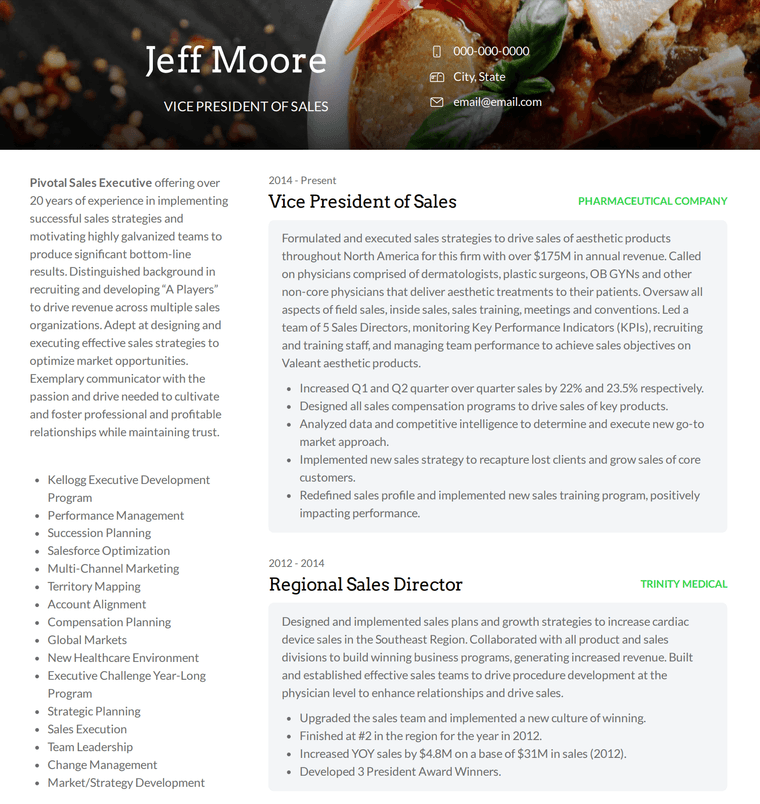
Should you customize your resume for Ireland jobs?
Yes, it’s important to customize your resume for every application. A generic, one-size-fits-all resume is not likely to land you an interview. Your resume needs to be specific if you want it to be successful.
To do this, update your resume for the country, the industry, and the job, every time you submit an application.
First, make sure your resume has all the requirements for the location you are applying to. If you are applying for a job in Ireland, make sure your resume has the correct personal information so it isn’t rejected automatically. In Ireland, resumes with a picture or date of birth might be rejected immediately, even if it is otherwise perfect.
Next, study the job posting closely. The company will have a detailed job description that clearly outlines exactly what kind of experience and skills they are looking for in an employee. Each bullet point in the posting will have a key word or phrase that the hiring manager (or applicant tracking system) is looking for. Use those keywords in your resume so that your resume matches the requirements as exactly as possible.
Finally, research the company as much as possible. They may have a company website, social media profiles, and employee reviews available online. You can use these to learn about the company’s mission and values. If you can express these same values in your resume, you will be able to demonstrate that in addition to being a great employee, you would be a great culture fit.
How to Write an Ireland Resume
Once you’ve settled on a resume format and a resume template, you are ready to start writing your resume. As you develop your Ireland resume, it’s important to make sure you have all the right resume sections.
To write a great Ireland resume:
List your contact details
At or near the top of your resume, it’s important to list your contact information. This information should be easy to find, but not too intrusive. Make sure your contact details are all professional, accurate, and current.
In the contact information section, include your:
- Name
- Email Address
- Phone Number
- Address
You may also want to include a link to an online profile, such as LinkedIn or Github. If you do include a link, make sure that everything on that online profile is completely professional and appropriate for the workplace.
Write a professional summary
Many job-seekers begin their resume with a short Summary or Professional Statement at the top of their resume. This section, while not strictly mandatory, is a great way to introduce yourself to a hiring manager on your resume.
A Summary section is a short section, usually only a few sentences or bullet points, where you can provide a few key skills, qualifications, or accomplishments that you would like to emphasize. It can serve as your elevator pitch to an employer, quickly summarizing who you are and what you can do.
If you open your resume with an effective summary, the hiring manager is much more likely to keep reading.
Describe your Work Experience
If you are writing a reverse-chronological resume, your Work Experience section will receive the most emphasis. This is where you outline your career history, listing past positions and offering skills and achievements from each role.
In your Work Experience section, list past roles in reverse-chronological order. For each job, list the:
- Job title
- Company name
- Employment dates
- Job description
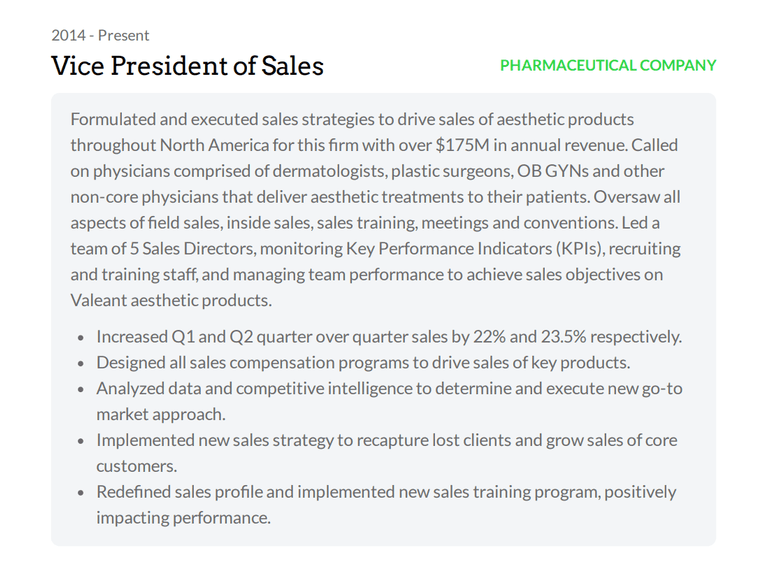
Your job descriptions are key to the success of your Ireland resume. If you want to impress hiring managers, you need to make sure you can write an effective Work Experience section.
To do this, try to focus on achievements rather than duties. A boring list of your responsibilities in a past role are not likely to impress hiring managers.
Achievements can include things like projects you contributed to, sales you made, clients you onboarded, or deals you negotiated. If you are having trouble thinking of achievements, try to think of aspects of the job that can be measured. Quantifiable achievements are concrete, verifiable examples of what you are capable of, and they look great on a resume. Measurable accomplishments can include customer success scores, revenues, and team sizes.
Further, make sure to use active language as much as possible when describing your achievements. Words like “executed”, “coordinated”, and “spearheaded” show leadership and initiative. Action verbs will make your work experience sound more dynamic, making it more likely to impress hiring managers.
Showcase your skills
Showcase your skills In your Skills section, provide a curated list of skills that are relevant to the job you are applying for.
If you are writing a reverse-chronological resume, your Skills section can be relatively short. Simply list skills in a bulleted list, with the most relevant skills right at the top.
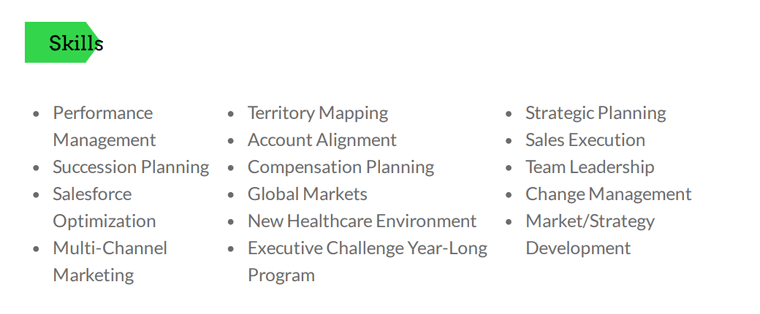
If you are writing a skills-based resume, you can put more emphasis on your Skills section. Make each skill or skill area a heading inside the Skills section, and provide descriptions and examples of each skill underneath. This will make your skills more central to your resume, so they draw more attention than your work experience.
At VisualCV, you can even add strength ratings to each skill for added visual appeal.

List your Education
In your Education section, list your degrees and certifications in reverse-chronological order. For each item in the section, include the:
- Degree
- School name
- Months attended (optional)
If you are an experienced worker, this will be enough information. You don’t need to go into detail about your education.
If you are a student or recent graduate, you may want to include more information about your degrees, such as coursework, specializations, or GPA.
Include additional resume sections
For many job-seekers, the sections above will be enough to showcase your qualifications and land an interview. If you have additional qualifications that don’t quite fit, however, you can always add more sections. Further Ireland resume sections might include:
- Volunteering experience
- Certifications
- Publications
- Portfolio
- Memberships
- Core competencies
- Interests
Copyright ©2025 Workstory Inc.